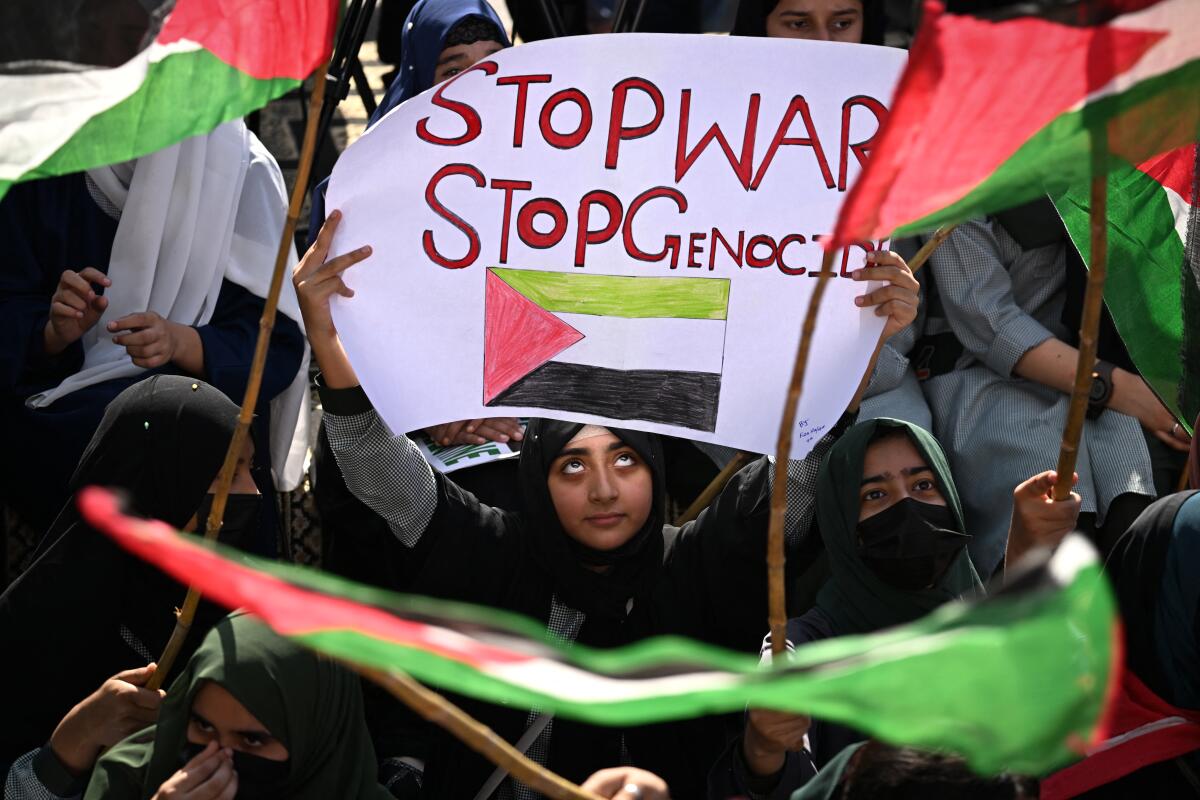JERUSALEM – Thursday's ceasefire agreement between Israel and Hamas was a welcome moment in one of the darkest periods of the decades-long conflict between Israelis and Palestinians. But for both Israeli Prime Minister Benjamin Netanyahu and Hamas, the deal could be a poison pill that leads to their downfall.
Netanyahu, who has been in office for a total of 17 years and is the longest-serving prime minister in Israeli history, must now grapple with events in Gaza that are very different from the vision he has used to win allies and keep his opponents at bay.
Hamas, on the other hand, faces a war-ravaged population that has grown weary of its rule even before the October 7, 2023 attack; Two years later, with more than 67,000 people killed, many more wounded and much of the Palestinian enclave in ruins, most Gazans are outraged by what they see as the militant group's reckless adventure.
Daily life continues in the war-torn Gaza Strip as Palestinians in Deir al-Balah wait for the October 9, 2025 ceasefire between Israel and Hamas to take effect.
(Ali Jadallah/Anadolu/Getty Images)
The deal, which President Trump struck after weeks of consultation with Israel and a number of Arab and Muslim countries, not to mention intense pressure on them, brings a measure of victory that both sides can claim: an exchange that will exchange all remaining Israeli hostages held by Hamas for thousands of Palestinian prisoners and detainees.
Netanyahu and Hamas called it an achievement.
“This is a diplomatic success, as well as a national and moral victory for the State of Israel,” Netanyahu wrote on X on Thursday, attributing the breakthrough to “firm determination, powerful military action,” as well as Trump’s efforts.
Hamas, meanwhile, said in a statement that the deal was the result of “the resilience of the Palestinian people” and their “Resistance,” referring to Palestinian factions.
However, these victories can hardly be called complete.
Netanyahu promised that Hamas would not only be defeated, but defeated and its arsenal destroyed. He also made it his mission to ensure that a Palestinian state did not emerge, something he hoped to achieve by conquering the Gaza Strip and annexing the West Bank.

Students and supporters of the political party Jamaat-e-Islami gather to express their solidarity with Palestinians during an anti-Israel protest in Islamabad, Pakistan, October 9, 2025.
(Aamir Qureshi/AFP/Getty Images)
Instead, the Israeli military stopped the offensive because the fate of Hamas' weapons is still unclear, and Trump recently said he would do so. “not allow” Israel annexes the West Bank.
Moreover, Trump 20 point plan not only put an end to the idea of deporting Gazans, but also encouraged them to stay. And Netanyahu was forced to accept the prospect of a Palestinian state just days after a fiery speech at the United Nations rejecting any such idea.
The coalition he relies on to stay in power is already showing signs of division, with extremist figures representing settler interests expressing their anger that Netanyahu has not held back and continued the fight.
Meanwhile, his opponents see the end of the conflict as a chance to overthrow him. And his critics among Israeli voters – elections are scheduled for October 2026 – intend not only to reject him at the ballot box, but also to expel everyone associated with his leadership.
In Tel Aviv's so-called Hostage Square on Thursday, Israelis showed some of that fury. As Benny Gantz, the Israeli opposition leader who served in Netanyahu's cabinet until last year, walked through the crowd, critics shouted at him to “go home,” accusing him of claiming success he didn't deserve.
“When the war started, Gantz joined Bibi and saved him instead of overthrowing his government,” said Einat Mastbaum, a 50-year-old Hebrew teacher, referring to Netanyahu by his nickname. Those actions, she said, kept Netanyahu's government in place and prolonged the ordeal of the hostages.
Udi Goren, 44, whose cousin Tal Haimi was killed on October 7, 2023, said Israel needs new faces to bring about the change many Israelis are demanding after this war.
“Now is the time for us – Israelis and Palestinians – to support a better future, to develop a new vision for ourselves,” he said. “After what we've been through in the last two years, we don't want it to happen again.”

Einav Zangauker, wearing a blue shirt, mother of hostage Matan Zangauker, celebrates people's reaction to news of the peace agreement between Israel and Hamas at the so-called Hostage Square in Tel Aviv on October 9, 2025.
(Chris McGrath/Getty Images)
However, it would be foolish to discount Netanyahu, a consummate politician on the Israeli political landscape who has proven time and time again his ability to gauge national sentiment and recover from setbacks, including lengthy corruption trial he successfully defied an International Criminal Court order throughout the war.
While his claims of complete victory over Hamas fall short, he can still rightly point to the fact that he has left Israel as the undisputed hegemon in the region, whether by destroying the Lebanese militant group Hezbollah or by delivering a crushing blow to Iran. If implementation of the agreement goes smoothly, he may also be able to extend normalization agreements to other Arab countries, including Saudi Arabia. Meanwhile, polls show that he has regained his popularity after the blow suffered in the first days after the October 7 attack.
And the deal will “support him,” said Dalia Sheindlin, a public opinion researcher in Israel.
“It will make him look like he is the only one in the country who could work so well with Trump.”
“He’s much more popular today than he was five days ago,” Trump said at the White House.
The situation with Hamas appears more complex. They have said they will have no role in the future governance of Gaza, a key Israeli and American demand. But his main rival, the Palestinian Authority, which governed Gaza until Hamas won elections in 2006, is seen by many Palestinians as hopelessly corrupt, not to mention outright traitorous, due to its security coordination with Israel, where government forces have attacked anti-Israel Palestinian resistance groups and activists.
At the same time, the idea that Hamas has any power seems untenable.
“They have put the whole of Gaza on fire. Our homes, our jobs, our future have been destroyed because of reckless decisions,” said Nidal Lakkan, 37, a former trader from Khan Yunis who has been forced to flee his homes over the past two years.
He said many people he knows feel the same way.
“People are unhappy. It was an ill-conceived gamble,” he said. “We need a new Palestinian leadership that will put our interests first. No more military steps without thinking about the people who will pay the price for it.”
Special correspondent Bilal Shbeir in Deir al-Balah, Gaza, contributed to this report.








